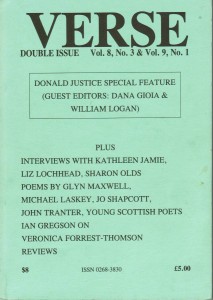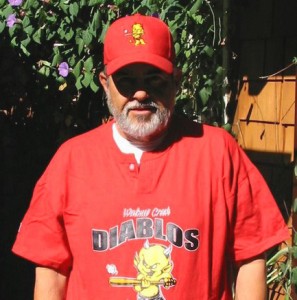 I’ve been slowly reading through a 1992 issue of a British literary magazine called “Verse,” which Larry found amid his books. It features Donald Justice, a poet I really like. I memorized this sonnet of his, which he wrote to get into John Berryman’s seminar at Iowa. According to Larry, who told me this story, many more students than the seminar could accommodate showed up the first day. Berryman assigned a sonnet, and only a few even tried–fewer were accepted.
I’ve been slowly reading through a 1992 issue of a British literary magazine called “Verse,” which Larry found amid his books. It features Donald Justice, a poet I really like. I memorized this sonnet of his, which he wrote to get into John Berryman’s seminar at Iowa. According to Larry, who told me this story, many more students than the seminar could accommodate showed up the first day. Berryman assigned a sonnet, and only a few even tried–fewer were accepted.
I like the mysteriousness of this sonnet about Adam and Eve eating from the tree of knowledge. It plays on a story we all know, and yet makes it happen anew. I especially admire how “the first omen” is that they “can find no flaw/ in all of Eden.” We humans don’t seem to be able to bear perfection very long! And “the first omen” sounds so full of dread, followed by the dream of the lion sharpening its claw. We know what’s going to happen and this sets it up. I also like how it takes us right up to the moment of exile and leaves us in dread.
The Wall
The wall surrounding them they never saw;
The angels, often. Angels were as common
As birds or butterflies, but looked more human.
As long as the wings were furled, they felt no awe.
Beasts, too, were friendly. They could find no flaw
In all of Eden: this was the first omen.
The second was the dream which woke the woman.
She dreamed she saw the lion sharpen his claw.
As for the fruit, it had no taste at all.
They had been warned of what was bound to happen.
They had been told of something called the world.
They had been told and told about the wall.
They saw it now; the gate was standing open.
As they advanced, the giant wings unfurled.
Donald Justice
When I memorized this poem, I decided to switch a line, so that the poem ended “As for the fruit, it had no taste at all.” The rhyme scheme still works that way, and I liked ending it with the sense of futility that line gives. But of course, that’s not Mr. Justice’s version, and he’s no longer around to discuss it. If he were, I’d write to him. I wonder what you think?
Meanwhile, although I admire Dana Gioia and William Logan enormously, the kind of literary criticism that appears in this volume seems beside the point (six different essays on his verse!). Either you like Donald Justice’s rather formal poetry or you don’t; discussing its format, analyzing its meter, and probing its origins doesn’t enhance my enjoyment of the poems. Au contraire. A surfeit of lit crit is one of the reasons I’m on my extended leave of absence from college.
 As Larry said this morning, “If all the literary criticism in the world were to disappear overnight we would be not one whit poorer.”
As Larry said this morning, “If all the literary criticism in the world were to disappear overnight we would be not one whit poorer.”
You might have noticed that there hasn’t been much “Stuff Larry Sez,” lately. He was gone, then I was gone. Larry went to the Ponderosa Stomp in New Orleans, a celebration of roots music that featured Big Jay McNeely, Lazy Lester, and many other colorful musicians. Larry is going to talk about this and give away some autographed photos on Mal Sharpe’s “Back on Basin Street” radio show on KCSM on Sunday, October 9, at 9 pm.
 Larry has been going though boxes, and found this note that I’d copied from a personal ad:
Larry has been going though boxes, and found this note that I’d copied from a personal ad:
